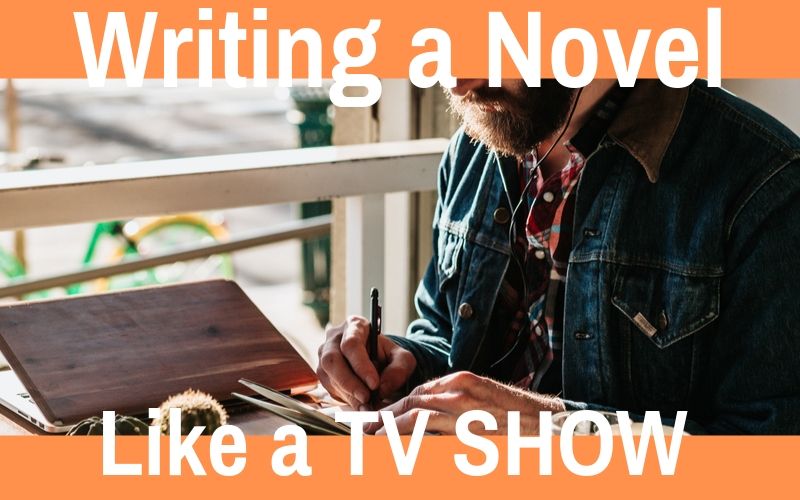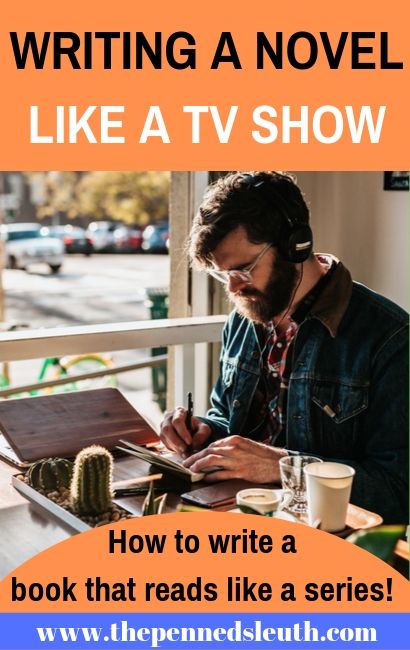Latest Writing Video! |
|
We all have our own ways of writing. Writers prefer to write for themselves, writing a story in a way that they enjoy reading it. Some writers prefer to write for the readers, giving them a structure the reader is no doubt familiar with. Yet, the question is raised whether you can write an enjoyable story and novel if it were written as a TV show? Let’s find out! Further ExplanationIt is necessary to explain this concept further before we tackle it’s merits and flaws. When I say ‘like a TV show’, I don’t just mean each chapter being an episode. To write a novel as a TV show, your dialogue needs to adjust and the sequence of events. There has to be a limit to what is done and as such, you are required to make each chapter eventful. Of course, this is a dramatic change from the norm, but to some, this is the only way they have ever written. Writers are inspired to write by many things. Be it a desire that kept growing till they actually started or a form of media inspired them to write their first novel. It can be absolutely anything, so why not a TV show? Well, let’s discuss the flaws of writing this way. The Bad SideFirst, when writing story the way you see a movie or episode of a TV series, you often make mistakes that leave readers wanting more. First, you have to write in the third-person, that much is obvious. Yet, it goes further as you can’t peek inside the characters’ heads. You don’t know what they are thinking or how they are feeling until they finally act on something or not act on something. It can be a surprise for the reader, which is great, but you don’t have that attachment to the character. That special bond that forms between a reader and they’re favourite character. In that way, the characters are only surface-relatable. You see how they behave and speak, but you don’t know what they’re all about until they have a monologue. Secondly, you are forced to create a chapter that is eventful across the board. Some characters shine each chapter, but there is always progress in every story. If your timelines clash, if your characters falter or your scene fall flat, you break the illusion, the immersion. The reader raises an eyebrow and that sense of wonder that comes from books is lessened. That is a heavy responsibility to carry. Thirdly, the structure is complicated, especially if you shift focus to different characters much like a TV show does. The reader needs to know what is happening with each central character and how they all fit in with each other. Yes, it’s a balancing act and a difficult one if you are a novice writer. The Good SideNow, before I throw you off the idea of writing this way, there are some wonderful benefits to having a story written this way. The first is the dramatism. TV shows and theatre work to be dramatic, to tell a story that is eventful and entertaining. That doesn’t mean it needs to make you laugh, but it needs to to keep you entertained, your emotions swirling in your heart. A dark story is only made colder this way, which is why it is often stories of this temperament that are written this way. Yet, you can still write a positive story if you wish. It can hold a unique charm that attracts readers and makes them fans. Being that chapters are episodic, it helps better structure a story in the sense of pacing. Your chapters will no doubt be longer and fewer, yet each chapter will guarantee some interesting events for the reader to enjoy. Finally, imagination. Imagination is a tool that writers take full advantage of when planning and writing their novel. In many cases, a writer will picture their story in a movie or TV show format. Yet, when writing the novel it is written more like an average novel. Chapters separating major plot points, following a single character, in the first-person etc. Hence, if a writer imagine their novel this way, it should be easier to write. The writing style will adjust, yet it will be closer to what the writer imagines. That in itself is a clear benefit of writing this way. The are various readers out there who enjoy various styles of writing, yet what is truly important is the writer enjoys their work. Surge of Young WritersI decided to write this article as their has been a large burst of young writers over the past few years. These writers have often been inspired by their favourite TV shows or movies. I have had a fair share of students who asked how they can get their writing style or plot closer to the structure of a TV show. For me, these questions were rare and unique, until I did further research. I can fully understand the writers interest in developing a novel with a style similar to something they enjoy. However, I grew up in a generation of writers who are more inspired by other books in structuring my style and story. There are plenty of pros and cons to every style and researching this one I found a few fascinating and insightful. It was a no-brainer for me to write an article on them and share it with you. ConclusionMy final thoughts on writing a novel this way are fairly positive. I notice that writing this way requires some deeper understanding on plot structure. For a novice writer, this is a challenge. Some writers might have a knack for it, but without a doubt most will make mistakes. That is why I can wholeheartedly recommend writing this way to interested writers. No doubt it has crossed a few minds, but the how is the difficult part. I can tell you, it isn’t too different from writing the basic structure of a novel. Yet, your chapters need to be far larger than normal. It depends on the age group and the ‘episode’ length. You will need to approach this writing style like a director. Describe with passion and create a saga in an entire book. Anything less than that will result in too few chapters. Of course, if your writing this way for young adults, your ‘episodes’ will be shorter, but generally longer than normal. If you are writing for adults, which is recommended, I recommend 10,000 plus words per chapter and more than seven or eight chapters. That is if you are writing a truly short book, a longer book will be around 15,000 words a chapter and as many chapters as you wish. Yet, if your book is looking a bit too large, perhaps a series of books or splitting it into two books will be better. A challenge to say the least, yet definitely worth attempting. Good day, goodnight and as always… Happy writing! Thank You!Dear Writer, Thank you for finishing this article. I had a lot of fun writing it and I hope you truly enjoyed it. There are many things you will learn from the writing experience and the 150 above are only a few. As a big thank you I would like to offer you something for FREE! A writing course on how to improve your main character! Click here to check it out your course. In addition, if would like to receive more content, bonuses and some big discounts on future courses, join the writers group here. Thank you very much for reading! Kind regards Matthew Dewey, Writer Pin for Later!
0 Comments
Leave a Reply. |







